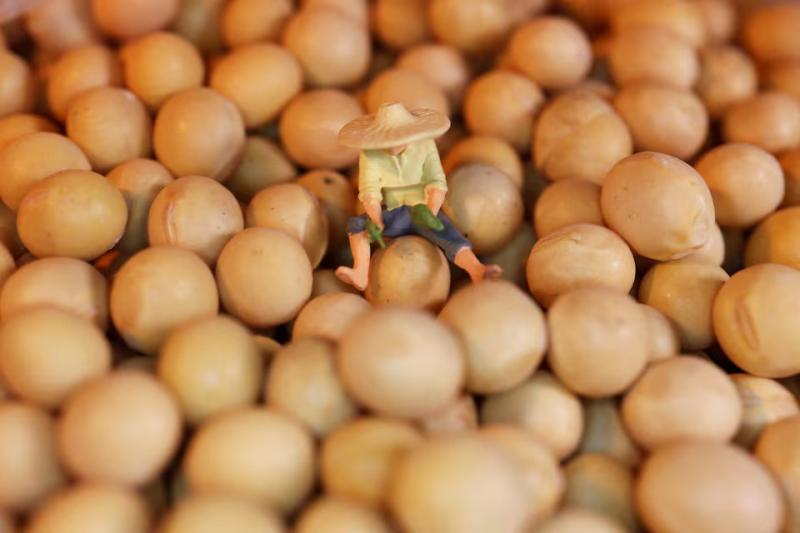How China reduced its reliance on US farm imports, softening trade war risks
By: Mei Mei Chu (Yahoo Finance)


Why does China understand how this stuff works -- and -- the United States doesn't?

Nov 12, 2024, BEIJING (Reuters) - Since the U.S. and China imposed tit-for-tat tariffs in their trade war during Donald Trump's first presidential term, Beijing has taken steps to reduce its reliance on American farm goods in a wider effort to bolster its food security.
That has put China in a better position to withstand tariffs of at least 60% on Chinese imports threatened by Trump, set to return to the White House in January, raising the prospect of Chinese retaliation again targeted at U.S. agricultural goods.
In his first term, Trump slapped duties on $370 billion worth of Chinese goods. Beijing retaliated with tariffs of up to 25% on over $100 billion worth of U.S. products, targeting soybeans, beef, pork, wheat, corn and sorghum.
In the years since, the share of China's soybean imports from the U.S. - the top American export to China - has dropped to 18% in 2024 from 40% in 2016, according to Chinese customs data, as China has turned instead to imports from Brazil, which has also replaced the U.S. as China's top corn supplier.
China's agriculture imports from the U.S. declined to $34 billion in 2023 from $43 billion in 2022, and are expected to drop further this year, according to Chinese customs data.
The following details China's efforts since the trade war with the U.S. to diversify agriculture supply sources, boost local production, and bolster food security:
Aug. 5, 2019: China halts purchases of U.S. agricultural products in retaliation against tariffs imposed by the Trump administration.
Jan. 16, 2020: Trump and China's then-Vice Premier Liu He sign a "Phase One" trade agreement where China agrees to raise purchases of American goods by $200 billion over two years, including $32 billion in agriculture products.
2021: China launches commercial trial planting for genetically-modified corn and soybeans.
April 29, 2021: China adopts anti-food waste law to prevent grain wastage and bans binge-eating videos and excessive leftovers.
Feb. 1, 2022: U.S. trade official says China failed to meet its commitments under the "Phase 1" trade deal that expired at the end of 2021. Agriculture Secretary Tom Vilsack tells lawmakers that China's purchases of U.S. farm goods fell short by about $13 billion.
Feb. 4, 2022: China allows imports of wheat and barley from all regions of Russia, the world's biggest wheat exporter.
March 7, 2022: President Xi Jinping tells political advisers: "China must rely on self-reliance and feed itself ... If we can't hold our own rice bowls, we will be controlled by others ... Food security is a strategic issue."
May 25, 2022: China allows imports of Brazilian corn.
June 28, 2022: China passes a soil conservation law to protect crop yields in the breadbasket provinces of Heilongjiang, Jilin, Liaoning and Inner Mongolia, where decades of rapid industrialisation and overuse of pesticides degraded soil and curbed yields.
April 14, 2023: In bid to curb soybean imports, China rolls out plan to reduce soymeal ratios in animal feed to less than 13% by 2025, from 14.5% in 2022. It plans to approve microbial proteins for feed and pilot projects to use leftover food and animal carcasses for animal feed.
May 4, 2023: China approves a variety of gene-edited soybeans, its first approval of the technology to boost yields. Unlike gene-modification (GMO), gene-editing does not introduce foreign DNA, instead it manipulates the existing natural genome.
Dec. 26, 2023: China issues licenses to a first batch of 26 seed companies to produce and sell genetically modified corn and soybean seeds in certain provinces.
April 9, 2024: China launches drive to boost grain production by over 50 million metric tons by 2030. China produced a record 695.41 million tons of grain output in 2023.
May 9, 2024: China approves the safety of gene-edited wheat.
May 28, 2024: China allows imports of two varieties of genetically-modified corn grown in Argentina, the world's third-largest exporter of the animal feed grain.
June 3, 2024: China's first food security law aimed at achieving "absolute self-sufficiency" in staple grains and food production comes into effect.
The law holds central and provincial governments accountable for incorporating food security into their economic and development plans, including protection of farmland from conversion to other uses.
Oct. 25, 2024: China launches a 2024-2028 action plan to accelerate development of smart farming and precision agriculture to raise food output.
China's agriculture ministry says the country is set to exceed a record 700 million metric tons of grain production in 2024.
(Reporting by Mei Mei Chu; Editing by Naveen Thukral and Sonali Paul)

Tags
Who is online
34 visitors


Do we need to outsource economic planning to China, too? Our own economic planners can't get beyond finding new and novel ways to screw workers out of nickels and dimes.
As part of the eradication of abject poverty in China rural farmers were trained and outfitted to improve farming techniques to guarantee maximizing crop yields using technology and mechanization, and it is showing its very positive results not only to increasing national food security but improving the lives of the farmers themselves. My wife, who grew up on a farm and really knows her stuff when it comes to growing things, maintains a half an acre plot of land near the mountains, within walking distance of our home, to which she goes almost every day to tend her many varieties of vegetables. We eat a lot of absolutely fresh delicious vegetables, some of which I don't even recognize, and I LOVE the absolutely fresh corn on the cob, eaten only hours after it is picked in order to minimize the turning of its sugar to starch which starts happening almost immediately upon picking. There are many such urban farmers around here, and in China everyone respects the other's plot and plants, often doing trades for what one grows that differs from what others grow. Here are examples of areas near us with multiple plots of land, although my wife's plot is elsewhere.
.
Interestingly enough, I saw similar urban farmer plots many years ago on a boulevard in Boston, and I've been told it still exists..
This is how national interest can coincide with personal interest.
The only "loser" here is agro-business, which isn't taking its skim. This is why China will win.
China has high-speed trains. China has electric cars. China has rare earths.
China has these things because there is an agency - the Communist Party - that has the power to decide to do things that will be good for the people. America has billionaires who have the power to decide to do things that will be good for them.
This is why China will win.
The “Great Leap Forward” took the lives of between 30 million and 40 million from 1959 to 1961. Then came "the cultural revolution" which unleashed gangs of Red Guards, who roamed China's cities targeting revisionists and other enemies of the state, especially teachers. Once the Red Guards got out of hand, Mao had to call in his army. All of which left another 1 million Chinese dead. The laogai, a system of 1,000 forced labor camps was extended throughout China. Another twenty million died there as a result of the conditions and 14-hour workdays. China also committed genocide against the Uyghurs.
And like every Communist country it denies basic human rights. China has used trade to undermine its trading partners. That is why the US lost its manufacturing sector.
Yes, it is on the rise Bob.
I'm glad that we all got to know you.
Good to see you're catching up with today.
Well that's a new standard I look forward to you living up to. Since the murder of tens of millions of its own citizens just 50 odd years doesn't matter to contemporary society, I guess nothing in America's history from the last century or before impacts our society today.
As we've seen in so many nations, history can really be a bitch. Fortunately, we live in better times, don't we ALL? But then there are those who cannot handle when they're actually inferior, so all they can do is hypocritically call up history and tell lies. Kind of reminds me of something we used to chant when we were little kids - "Sticks and stones may break my bones, but names will never hurt me."
I can't answer, Sean. TPTB have declared that I may not say
Exactly. Think how gloriously that worked out for the USSR, Cuba, Venezuela etc..
It sure doesn't take much prodding for the left's love of authoritarianism to surface does it? The progressive left "worshipping totalitarian states since 1917!"
I can't answer, Sean. TPTB have declared that I may not say
While about half the population is spending its time arguing and fighting over politics with about the other half of the population. The proof of that is what you see on the Front (Home) Page of this very social news site which represents a microcosm of the greater population, perpetuating that time-wasting battle. And the beat goes on.....
Yup